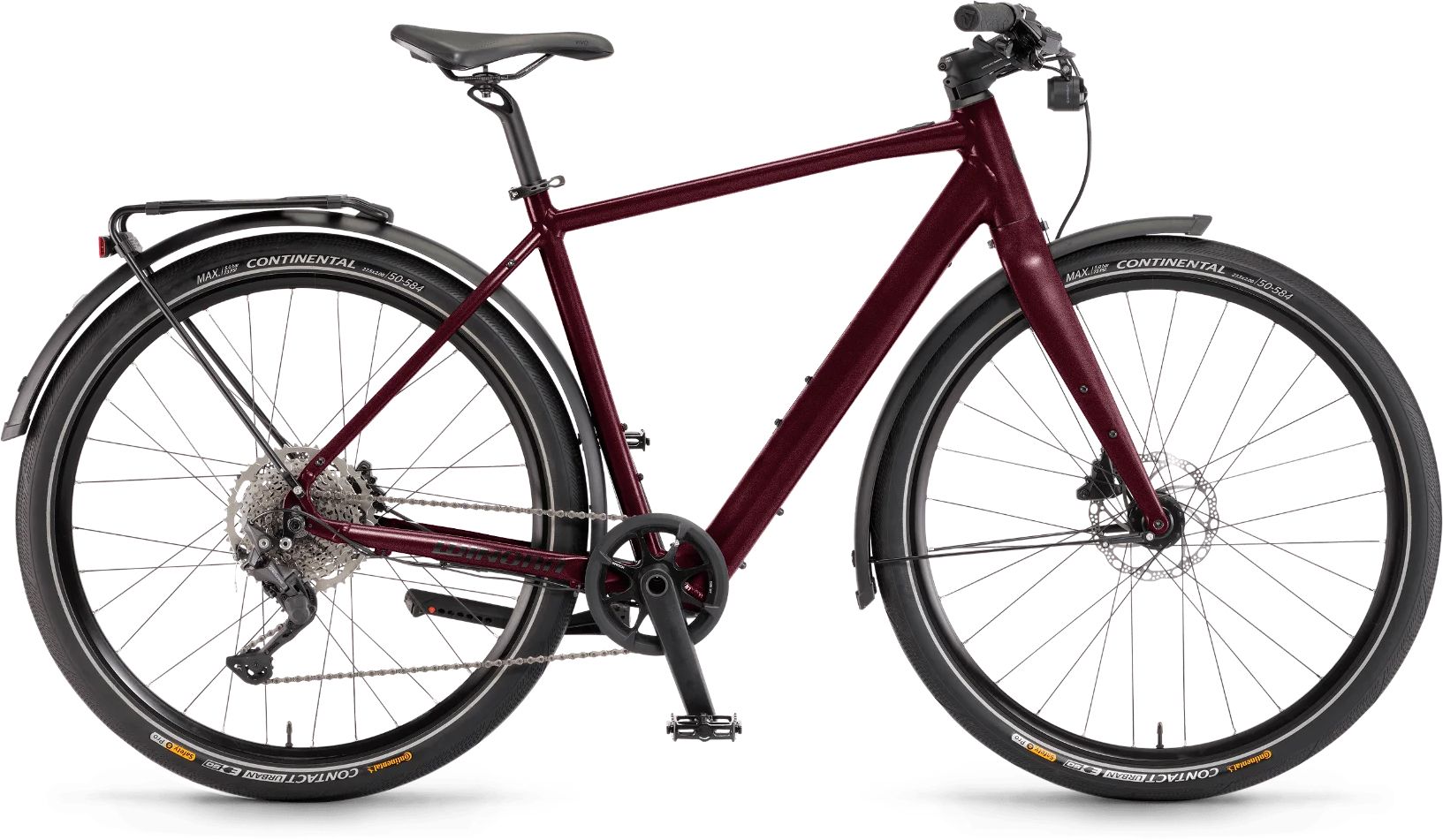Ebikes are already a mass transportation means in the Netherlands
As we pointed out here, in the Netherlands a whopping 23% of all the trips are made by bike. Roughly half of the bikes sold in that 17 million inhabitants country are ebikes. The effects are reckoned in 19 billion euros saved on health costs, six months increased life expectancy, 3% increase of GNP, 6500 deaths spared per year, just to name a few (source: National Library of Medicine, an official website of the U.S. Government). Since only about a half of the Dutchmen frequently use a bike, health benefits amount to roughly €2000 a year per capita. Economic benefits could exceed that, in terms of spared fuel and car costs and more fluid urban traffic.

Bikes in Amsterdam
What is hindering mass transportation by ebike
- Sales of e-bikes keep growing in Europe
- Is ebikes transportation of masses just around the corner? Not really!
- What prevents Europeans from riding instead of driving?
- Is ebike price restricting their adoption?
- Could a quality ebike cost less than nowadays models?
- Leasing, subventions, rent to buy and credit buying
- Schools could be decisive
- Reducing value added tax on ebikes
- Lack of bike and ebike facilities
- Batteries fake news and bashing
- Wrong beliefs about ebikes speeds
- Little sustainable economic assumptions
Sales of e-bikes keep growing in Europe
In countries like France and Italy, about 2 million cars are sold every year. Well, more or less starting in the second decade of the present millennium, bikes are yearly overselling cars, although only by a very few thousands. Of those, roughly 30% are ebikes. That notwithstanding, ebikes can’t be considered a massively adopted transportation means yet.
Is ebikes transportation of masses just around the corner? Not really!
The fact is, that more than half of the ebikes sold are used for touring or mountain biking. Moreover, the majority of those ebikes are bought by old or retired people: the biggest age group of e-bike owners goes from 55 to 65 years. In France, for example, only 3% of workers daily commute by bike or ebike. To make things worse, the age group 26 to 35 accounts for a mere 3% of ebike sales, and those who are 36 to 45 for just 8%. What will happen when the eldest ebikers will be too old to buy a new ebike? Will they be replaced by those that now are aged under 46? As usual, you have to put statistics into the general context, taking into account that the age group going from 55 to 65 years is also the most numerous group in Europe. Still, retired people account for 46% of ebike owners, although they represent only 27% of the total population.
What prevents urban dwellers from riding instead of driving?
Of course, those lucky ones who can enjoy inexpensive and handy public transports seldom need ebikes as a means of transportation. Nevertheless, ebikes could replace cars for city trips, be it commuting, shopping, visiting or even bringing kids to school. A survey conducted in France pointed out what hinders ebike adoption: for 70% of respondents, it’s their expensive price, followed by lack of need (33.5%) fear of theft (26.2%), and the inability to repair one’s own ebike (24.6%). Respondents could give more than one answer.
Is ebike price restricting their adoption?
Regarding ebikes as an alternative to cars, we consider just city and trekking ebikes. Their prices generally go from 500 to 6,000 euros. So entry-level ebikesy could be considered inexpensive. In the reality, if one needs to ride his ebike every day, a cheap ebike presents several inconvenients. Its battery and motor don’t last long, range is quite limited, brake pads must be replaced often, tires and spokes are quickly twisted, transmission and drive parts like chainrings, chains and shifters don’t perform well and must quickly be replaced, riding comfort is scarce, and on top of that the battery can catch fire.

Bikes in Amsterdam
Could a quality ebike cost less than nowadays models?
Presently, a robust, reliable and durable urban or trekking ebike cost somewhere north of €2000. We deem that price to be reasonable, considering the money it can spare you by often replacing car usage, to say nothing about health benefits. Nevertheless, most people are not aware of these benefits, or can’t even fathom them. Neither are they encouraged to try and experience them by spending sums that seem hefty at a glance. Hence the need to produce more affordable ebikes. The problem is, quality comes at a lofty price. Even focusing on scale economies and price worthiness, we don’t think any manufacturer could lower actual ebike prices by more than 10%. Solutions should be found elsewhere.

Winora E-Flitzer-2023 ebike, selling for less than 2,000 euros
Leasing, subventions, rent to buy and credit buying
Local and government subventions have thoroughly helped ebike adoption for commuting. Even companies now offer benefits to allow their employees ebiking to work. As it is the case for cars, leasing would also help, as well as facilitated access to credit for ebike purchasing. Enabling people to easily experience the advantages of commuting and moving by ebike would greatly foster ebike adoption by the masses as a means of transportation.
Ebike shops and manufacturers could promote rent-to-buy, whereby individuals could rent an ebike and deduct the already paid rental fees from the purchasing price, should they decide to buy it, as it already happens with leased cars.
Schools could be decisive
Schools could play an effective role in promoting ebike usage by students. For instance, building sheltered bike parks, secured against thefts. They could also rent ebikes at convenient prices to students, setting up workshops where technical students could repair and maintain those ebikes.
Reducing value added tax on ebikes
The Belgian government had been planning since 2019 to reduce value added tax, or V.A.T., on bicycles and ebikes in Belgium, from 21% to 6%. Unfortunately, it has decided to abandon its planned tax cut, for budgetary reasons. If we are to reckon that 100,000 e-bikes a year are sold in Belgium, for an average price of 1,800 euros, that sums up to reduced ebike tax revenues of 100,000 x 1,800 x 15% = 27,000,000 euros, peanuts for a country of 10 million people, compared to the economic, environmental and health benefits that such a tax reduction would bestow. That is tantamount to affirm a worrying unwillingness to invest public money for preserving the environment.
Lack of bike and ebike facilities
Riding a bike in urban areas is often more or less unsafe. Bike lanes are scarce, bike parks not frequent, ebike charging stations almost inexistent. All those would surely play a role in spreading ebike adoption. Lack of space and of financial means in most European municipalities don’t bode well for a quick implementation of those structures.
Batteries fake news and bashing
We already wrote here about battery pollution, which is ridiculous compared to that of internal combustion engines, be it for production or usage. A few days ago, the BBC’s website published an article reporting that the Lords Climate Change Committee urged the government to build consumer confidence and push back against what it called mistruths on range and cost. A Lords states that the government must do more to counter “misinformation” on electric vehicles published in parts of the UK press, has said. A huge 20% of Frenchmen polled by Cerema (French government think tank for transport and environment) responded not wanting an ebike because it’s polluting! Haven’t they ever smelled what a car exhaust pipe spits? Do they realize that ebike riding can replace car driving, at least in urban areas? Much is to be done to educate the masses.
Wrong beliefs about ebikes speeds
Some believe that city trips are slower by ebike than by car. That is false, inasmuch ebikes can always be in pole position at red traffic lights, and can soon be parked very close to your destination.
Little sustainable economic assumptions
If we are to assume that consumption helps GDP growth and public wealth, then buying cars and using them can be deemed as beneficial. On the other hand, if we value life quality and an intelligent allocation of resources that promotes true human development and happiness, ebikes are a precious tool. The money saved on a car usage and purchase can be spent for education, high-tech items, travels: shortly, on things that can unleash anybody’s own potentialities, much more than driving a gas guzzler. Not to talk about the actual, worldwide environmental crisis.
Your suggestions to promote widespread usage of e-bike for transportation are very welcome!



Much of my career I had to commute 30-50 miles each way so a bike wasn’t practical. But 5 years ago I got a job about 3 miles per day. Steep hills hindered me from riding a non electric as I was arriving quite sweaty. Broke down and bought a good quality ebike and love it!
An adequate infrastructure is key! Unfortunately in our area adding protected bike lanes severely narrowed the streets which angered many drivers (who don’t like bicyclists anyways!). I wish they had come up with a better solution but I’m grateful for the protected lanes. Now if only I could fix the winter weather in Michigan.
Hi David,
Thank you for sharing. I admire brave riders challenging Michigan winter! I personally wear leggings and pants, and protect my battery with a leather sleeve, although here it plummets barely 3-4 C° below zero.
Keep up the good riding!
Luca